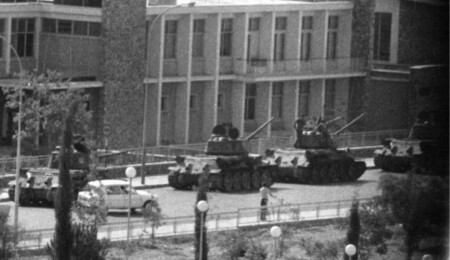S Cyprus Marks Anniversary of 1974 Coup d’état

Tuesday marked 51 years since a Greek military junta-sponsored coup d’état overthrew the Cypriot government of the day, which was led by Archbishop Makarios III.

The coup was led by rebel factions of the National guard and the Eoka-B paramilitary organisation, and had been ordered by Dimitrios Ioannidis, one of the leading figures in the Greek junta of the day.
On July 15, 1974, Greek officers led National guard members to capture Cyprus’ presidential palace, with Makarios fleeing via its rear entrance and travelling to Paphos, before being flown from the British Royal Air Force base in Akrotiri to Malta the following day.
With Makarios gone, Nikos Sampson was installed as president and the Hellenic Republic of Cyprus was proclaimed.
The coup leaders proclaimed their victory via public broadcaster CyBC, saying that “the National guard intervened in order to solve the problematic situation” and that Makarios was dead.
Thereafter, the press was heavily censored, with only three right-wing Greek Cypriot newspapers – Machi, Ethiniki, and Agon – continuing to publish on the island during the short period in which Sampson held power.
At the time, Turkish Cypriot leader of the day Rauf Denktash said he believed the events were “among Greek Cypriots”, though he did warn Turkish Cypriots not to go outside and call on the United Nations peacekeeping force in Cyprus (Unficyp), to take extra measures to ensure Turkish Cypriots’ safety.
Five days after the coup was staged, Turkey staged an invasion of the island’s north, saying this action was in line with its responsibilities as a guarantor power of Cyprus.
Sampson was forced to resign on July 23, with Glafcos Clerides leading the Republic of Cyprus’ government until Makarios returned on December 7. Clerides later served as president in his own right between 1993 and 2003.
Turkey had by the end of the summer taken control of nearly a third of the island’s territory, with Denktash leading a provisional administration which became the Turkish Cypriot federated state in 1975. He would go on to declared the unrecognised ‘Turkish Republic of Northern Cyprus’ in 1983.
In Greece, the fiasco in Cyprus led senior military officers to withdraw their support for Ioannidis, with junta-appointed president Phaedon Gizikis calling a meeting of old-guard politicians with the aim of appointing a national unity government with the aim of leading the country to democratic elections.
On July 23, 1974, Gizikis invited Kostas Karamanlis to lead the government, with democratic elections being held on November 17. Those elections were won by Karamanlis’ New Democracy party.
On Tuesday, political parties commemorated the day, with Disy announcing that “for the Greek Cypriots, July 15 will always be a day which painfully reminds us of the consequences of deviating from the democratic order”.
“The treacherous coup is not just a historical mistake; it was the starting point of a national tragedy which gave Turkey the pretext for its illegal invasion and occupation, which continues to this day.”
“In this context, memory is not punitive, it is a guide to responsibility. It is our duty to ensure that history does not repeat itself, since decades later, Cyprus’ wounds remain open. International legality has been violated, human rights are trampled on, and Turkey continues, with aggression and revisionism, to stand as a barrier to every effort for a just and sustainable solution.”
Akel leader Stefanos Stefanou, meanwhile, said that on July 15, 1974, Cyprus “was enveloped in the darkness of fascism”, and warned that “51 years later, fascism is about to raise its head again”.
“The far right is trying to come to the fore this time dressed up nicely and smiling. However, when darkness falls, it becomes itself again, a battalion of violence which strikes at random in pogroms aimed at unions and whoever else it christens the enemy. We have experienced them, we know them, and we will not let them throw Cyprus off the cliff this time,” he said.
Diko said July 15, 1974 constitutes “a black page in the history of Cyprus”.
“Fifty-one years later, it remains vivid in our memory as the day of betrayal which opened the doors wide to Attila, marking the starting point of the greatest tragedy in the history of the Republic of Cyprus. Fifty-one years later, our people continue to experience the tragic consequences of the twin crimes,” it said.
Source: Cyprus Mail



Comments
Attention!
Sending all kinds of financial, legal, criminal, administrative responsibility content arising from illegal, threatening, disturbing, insulting and abusive, humiliating, humiliating, vulgar, obscene, immoral, damaging personal rights or similar content. It belongs to the Member / Members.